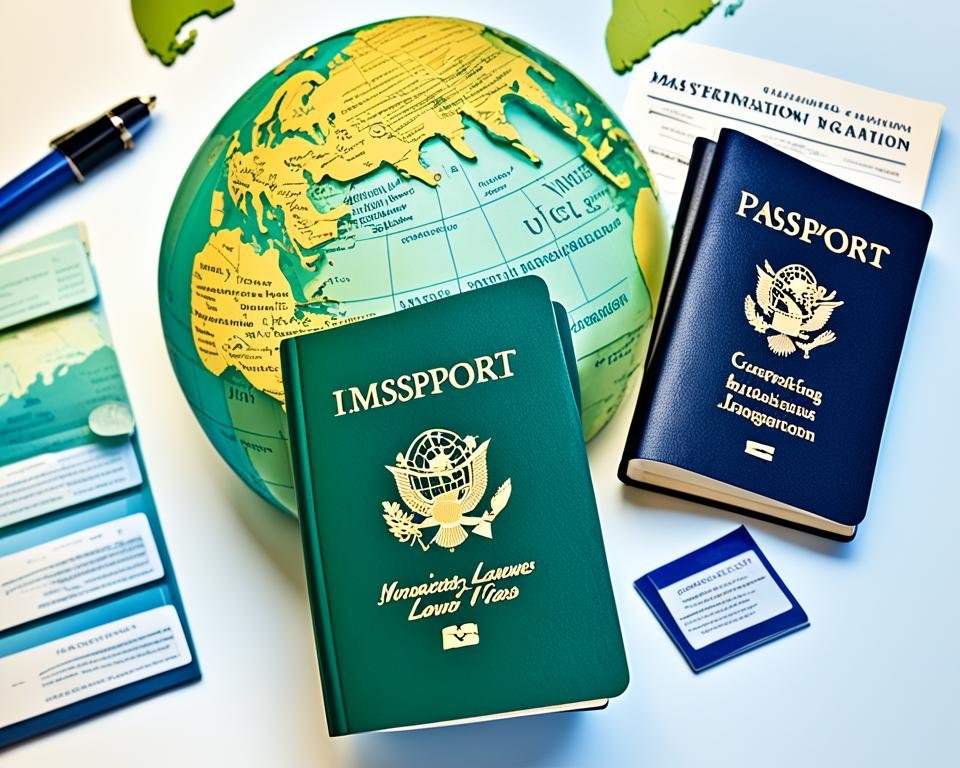Hello, I’m excited to share with you the most impactful cultural exchange programs available. These programs offer an incredible opportunity to explore the world, immerse yourself in different cultures, and create lifelong memories. Whether you’re a student, a professional, or someone passionate about cultural exchange, there’s a program out there that can fulfill your desire to connect with people from around the globe.
Through cultural exchange programs, you can broaden your horizons, gain a deeper understanding of different perspectives, and develop intercultural competencies that will benefit you personally and professionally. These programs have the power to bring people together, foster mutual respect, and create a more tolerant and connected world.
So, if you’re ready to embark on an adventure that will open your eyes to new experiences, traditions, and ideas, join me as we explore the most impactful cultural exchange programs available.
Key Takeaways:
- Cultural exchange programs offer a unique opportunity to explore the world and connect with people from different cultures.
- These programs promote mutual understanding, respect, and tolerance.
- They provide personal and professional growth opportunities.
- Cultural exchange programs contribute to building a more interconnected and collaborative global society.
- Through these programs, participants can develop intercultural competencies and gain a broader perspective on the world.
Understanding Cultural Exchange Programs
In this section, I will delve into the concept and purpose of cultural exchange programs, shedding light on how they facilitate the sharing of ideas, feelings, and values between individuals from different cultural backgrounds. Cultural exchange programs play a crucial role in promoting global understanding and fostering cross-cultural connections, offering participants the opportunity to develop intercultural competence and create meaningful connections with people from around the world. Let’s explore the definition and purpose of cultural exchange programs, their historical background and evolution, as well as how they differ from study abroad programs and work placements.
Definition and Purpose
Cultural exchange programs can be defined as structured initiatives that bring individuals from different cultural backgrounds together to engage in meaningful interactions, share experiences, and develop a deeper understanding of different cultures. These programs aim to promote mutual respect, cultural appreciation, and global citizenship by creating opportunities for cultural immersion, language learning, and intercultural dialogue.
Historical Background and Evolution
The roots of cultural exchange programs can be traced back to ancient times when civilizations interacted through trade, migration, and exploration. However, the modern concept of cultural exchange programs emerged in the mid-20th century, spurred by a growing desire for international understanding and peace after the devastating world wars. Organizations like the Fulbright Program, established in 1946, played a pivotal role in promoting cultural diplomacy through academic exchanges. Since then, cultural exchange programs have evolved to encompass a wide range of activities, including student exchanges, volunteer projects, professional internships, and artistic collaborations.
How Cultural Exchange Programs Differ from Study Abroad and Work Placements
While cultural exchange programs share similarities with study abroad programs and work placements, they have distinct characteristics that set them apart. Study abroad programs primarily focus on academic pursuits, offering students the opportunity to study in a foreign country and earn academic credits. On the other hand, work placements provide individuals with the chance to gain professional experience in an international setting. Cultural exchange programs, however, place a stronger emphasis on intercultural exchange, personal growth, and building lasting connections. Participants engage in activities that bridge cultural differences, such as living with host families, participating in community service projects, and immersing themselves in local traditions and customs.
| Study Abroad Programs | Work Placements | Cultural Exchange Programs |
|---|---|---|
| Focus on academic pursuits | Emphasize professional experience | Prioritize intercultural exchange and personal growth |
| Typically short-term | Can be short- or long-term | Varies in duration and intensity |
| Classroom-based learning | Workplace-based learning | Cultural immersion and experiential learning |
By embracing cultural exchange programs, individuals can broaden their perspectives, enhance their cultural competence, and develop the skills necessary for effective global citizenship. The next section will delve into the insights and opportunities provided by international cultural exchange experiences, highlighting the role they play in a globalized society and the formal structures and organizations that support these interactions.
Insight into International Cultural Exchange
In this section, I will provide valuable insight into international cultural exchange, discussing its role in a globalized society, the formal structures that support cultural interactions, and the organizations that facilitate these exchanges.
Role of Cultural Exchange in a Globalized Society
Cultural exchange plays a crucial role in promoting global understanding and cooperation. It fosters the sharing of diverse perspectives, knowledge, and experiences, allowing individuals to develop empathy, tolerance, and respect for different cultures. By engaging in cultural exchange, we can break down barriers, bridge gaps, and build stronger connections among people from various backgrounds.
Formal Structures Supporting Cultural Interactions
Formal structures, such as educational institutions and government departments, play a vital role in supporting cultural interactions. Educational institutions, including universities and schools, often offer exchange programs and scholarships to facilitate cultural exchange among students. These programs provide opportunities for students to study abroad, immerse themselves in different cultures, and develop a global mindset. Government departments also play a part in supporting cultural exchanges by implementing policies, creating partnerships, and fostering international collaborations that promote cross-cultural understanding and dialogue.
Organizations Facilitating Cultural Exchanges
There are various organizations dedicated to facilitating cultural exchanges on a global scale. These organizations serve as platforms for individuals and communities to connect, collaborate, and engage in meaningful cultural exchanges. They organize programs, workshops, and events that bring people from different cultures together, creating opportunities for dialogue, learning, and mutual enrichment. Some well-known organizations facilitating cultural exchanges include the International Cultural Exchange Organization (ICEO), the Global Cultural Exchange Network (GCEN), and the Cultural Exchange and Understanding Society (CEUS).

| Organization | Mission | Website |
|---|---|---|
| International Cultural Exchange Organization (ICEO) | Dedicated to fostering cross-cultural understanding through various exchange programs. | www.iceo.org |
| Global Cultural Exchange Network (GCEN) | Connects individuals and communities worldwide, promoting intercultural dialogue and collaboration. | www.gcennetwork.org |
| Cultural Exchange and Understanding Society (CEUS) | Empowers individuals to embrace diversity, promoting cultural exchange for mutual understanding. | www.ceusociety.org |
The Significance of Student Exchange Programs
Student exchange programs are a significant aspect of cultural exchange, offering young people the opportunity to study abroad and live with a host family. These programs provide more than just academic learning; they offer lifelong lessons that go beyond the classroom.
Lifelong Lessons Beyond Academics
Participating in a student exchange program exposes students to new cultures, customs, and perspectives. It challenges them to adapt to new environments, communicate across language barriers, and navigate unfamiliar situations. These experiences foster personal growth, resilience, and independence, equipping students with valuable life skills that extend far beyond their academic pursuits.
Global Education through Student Exchange
Student exchange programs play a crucial role in promoting global education. They provide students with the opportunity to develop a global mindset, crucial in today’s interconnected world. By immersing themselves in a different culture, students gain firsthand knowledge and understanding of international issues, enhancing their intercultural competence and empathy towards others.
Cross-Cultural Experiences as Learning Platforms
One of the greatest strengths of student exchange programs is the ability to offer cross-cultural experiences as learning platforms. Students interact with people from different backgrounds, learning to appreciate diverse perspectives and challenging their assumptions. These experiences foster a greater sense of cultural awareness, open-mindedness, and the ability to navigate diverse environments successfully.
Student exchange programs truly provide a transformative experience that shapes individuals into global citizens. Through lifelong lessons, global education, and cross-cultural experiences, these programs offer a unique opportunity for personal growth, enhanced cultural understanding, and the development of crucial skills for success in an increasingly interconnected world.
Volunteering: A Pillar of Cross-Cultural Programs
Volunteer work plays a crucial role in cross-cultural programs, offering participants the opportunity to contribute to global communities while also experiencing personal growth. By engaging in volunteer activities, individuals can make a tangible and positive impact on the world while gaining valuable insights into different cultures and societies.
Contributing to Global Communities
Volunteering in cross-cultural programs allows individuals to actively contribute to global communities in need. Whether it’s working on environmental conservation projects, supporting education initiatives, or providing healthcare assistance, volunteers make a difference by addressing critical social and environmental challenges around the world. By dedicating their time and skills, volunteers help improve the lives of individuals and communities, fostering positive change on a global scale.
Personal Growth through Volunteer Work
Engaging in volunteer work within a cross-cultural context also offers significant opportunities for personal growth. By stepping outside their comfort zones and immersing themselves in diverse environments, volunteers develop invaluable skills such as adaptability, intercultural communication, and empathy. Through hands-on experiences, they gain a deeper understanding of global issues, enhance their problem-solving abilities, and refine their leadership skills. Moreover, volunteering often leads to self-discovery, boosting confidence and self-awareness.
International Organizations Offering Volunteer Opportunities
Various international organizations provide opportunities for individuals to engage in cross-cultural volunteer programs. These organizations facilitate meaningful and impactful experiences by connecting volunteers with local communities and supporting them throughout their journey. Some prominent international organizations that offer volunteer opportunities include:
| Organization Name | Focus Areas |
|---|---|
| International Volunteer HQ | Education, healthcare, environmental conservation |
| United Nations Volunteers | Humanitarian aid, sustainable development, peacebuilding |
| Projects Abroad | Teaching, community development, wildlife conservation |
These organizations offer a wide range of volunteer opportunities, allowing individuals to choose projects aligned with their interests and skills. Volunteers can embark on meaningful journeys, creating positive change and forging connections with communities across the globe.

Cultural Exchange Programs
When it comes to cultural exchange, there are a variety of programs available that cater to different interests and goals. Whether you’re a student looking to study abroad, a professional seeking career development opportunities, or an individual eager to immerse yourself in a new culture, cultural exchange programs can provide you with unique experiences and incredible benefits.
One of the most popular types of cultural exchange programs is student exchange. This program allows students to live and study in a foreign country, gaining valuable insights into the culture, language, and education system. It offers a chance to broaden their horizons, develop cross-cultural communication skills, and make lifelong connections with people from around the world.
Another type of cultural exchange program is professional exchange. This program is designed for professionals who want to expand their knowledge, skills, and networks in a global context. By participating in a professional exchange program, individuals can gain valuable work experience, learn from experts in their field, and develop a global mindset that is highly valued in today’s interconnected world.
For those seeking a more immersive experience, cultural immersion programs are an ideal choice. These programs allow participants to fully immerse themselves in the culture of a foreign country, living with a host family and engaging in various cultural activities. Cultural immersion programs provide a deep understanding of the local traditions, customs, and way of life, fostering personal growth, empathy, and intercultural competence.
Each type of cultural exchange program offers its own unique benefits. Whether it’s gaining a global perspective, enhancing language skills, building a professional network, or developing a greater appreciation for diversity, cultural exchange programs provide individuals with the opportunity to grow personally and professionally, while fostering mutual understanding and respect between different cultures.
Breaking Barriers with Virtual Cultural Exchange Programs
Advancements in technology have paved the way for virtual cultural exchange programs, revolutionizing the way we break down barriers and facilitate cultural learning. Through virtual platforms, individuals now have the opportunity to engage in meaningful intercultural experiences regardless of their physical location.
Technological Bridges in Cultural Learning
Virtual cultural exchange programs utilize a range of technological bridges to connect individuals from different cultural backgrounds. These platforms incorporate video conferencing, real-time language translation, and interactive virtual environments, enabling participants to communicate, collaborate, and learn together, as if they were in the same room. These technological bridges play a crucial role in fostering intercultural understanding by promoting direct and authentic interactions.

Accessibility and Flexibility of Virtual Exchange
One of the key advantages of virtual cultural exchange programs is their accessibility and flexibility. Participants no longer face geographical or financial constraints that may have hindered their ability to engage in traditional cultural exchange programs. Virtual programs offer the opportunity for individuals from diverse backgrounds to connect and learn, leveling the playing field and promoting inclusivity. Moreover, the flexibility of virtual exchange allows participants to engage at their own pace and fit the program into their existing commitments, making cultural learning more accessible to a wider range of individuals.
The Future of Intercultural Learning in a Digital Age
The rise of virtual cultural exchange programs signals a shift towards a future in which intercultural learning becomes seamlessly integrated into our digital lives. As technology continues to evolve, we can expect even more immersive and interactive experiences that bridge cultural gaps and foster global understanding. Virtual exchange has the potential to reach unprecedented scale, connecting individuals from every corner of the globe and fostering a genuine appreciation for diverse perspectives and cultures. This exciting future holds the promise of a more interconnected and culturally enriched world.
Professional and Scholarly Global Exchange Programs
In today’s interconnected world, professional and scholarly global exchange programs play a crucial role in fostering networking, knowledge sharing, and cross-cultural collaboration. These programs provide individuals with unique opportunities to expand their professional horizons, deepen their understanding of different cultures, and contribute to global diplomacy and cultural relations.
Networking and Knowledge Sharing Across Borders
One of the key benefits of professional global exchange programs is the opportunity to network with professionals from around the world. By connecting with experts in their field, participants can gain valuable insights, exchange innovative ideas, and establish lasting connections that can enhance their professional growth and development. Through networking events, conferences, and collaborative projects, participants can broaden their perspectives and build a diverse global network.
Impact on Global Diplomacy and Cultural Relations
Professional global exchange programs also play a significant role in promoting global diplomacy and cultural relations. By bringing professionals from different countries together, these programs facilitate dialogue, understanding, and cooperation on a global scale. The exchange of knowledge, experiences, and perspectives through these programs fosters mutual respect and strengthens international relationships, contributing to peaceful coexistence and cultural diversity.
Government-Supported Initiatives for Professional Development
To support professional development and encourage international collaboration, many governments around the world provide initiatives and funding for professional global exchange programs. These government-supported initiatives aim to enhance the skills and expertise of professionals in various fields, promote economic growth, and facilitate the exchange of best practices. By investing in these programs, governments recognize the value of global cooperation and the positive impact it has on individuals, organizations, and societies as a whole.
| Benefits of Professional Global Exchange Programs | Government-Supported Initiatives |
|---|---|
| Enhanced professional network | Financial support for program participation |
| Access to global expertise and knowledge | Opportunities for international collaborations |
| Cultural immersion and understanding | Support for cross-cultural training and language learning |
| Promotion of global diplomacy and cultural relations | Recognition of program participation through certifications and awards |
Maximizing Intercultural Competence Through Cultural Immersion Programs
Cultural immersion programs provide an invaluable opportunity for individuals to truly live the culture of the host community, allowing them to maximize their intercultural competence. These programs go beyond mere tourism, offering participants a deep and authentic experience that fosters meaningful connections and broadens their perspectives.
Travelling Beyond Tourism: Living the Culture
In cultural immersion programs, participants have the chance to delve into the customs, traditions, and daily life of the host community. By living among the local population, they gain a rich understanding of the culture that goes far beyond what can be learned through sightseeing or brief visits.
Living the culture involves immersing oneself in the local traditions, trying regional cuisine, engaging in local celebrations and rituals, and interacting with the community on a personal level. This firsthand experience allows participants to develop a deep appreciation for the values and beliefs of the host culture.
Furthermore, cultural immersion programs provide the opportunity to learn the local language, which is essential for effective communication and building meaningful connections. By conversing with locals in their native tongue, participants can bridge cultural barriers and develop a more profound understanding of the local community.
Gaining Perspective: The Broad Effects of Immersive Experiences
Immersive experiences in cultural immersion programs have a broad range of effects that go beyond personal growth. By stepping out of their comfort zones and embracing new ways of life, participants develop a heightened sense of empathy and cross-cultural understanding.
Living within a different culture allows individuals to gain a fresh perspective on their own values, beliefs, and assumptions. They become more aware of the diversity and complexity of the world, appreciating the similarities and differences that exist among different cultures.
Through firsthand experiences and interactions, participants develop a global mindset, understanding the interconnectedness of the world and the importance of collaboration and cooperation. This mindset prepares them to navigate the complexities of an increasingly globalized society and work effectively with individuals from diverse backgrounds.
Developing Empathy and Global Mindset
Cultural immersion programs foster the development of empathy—a fundamental quality for successful intercultural communication. By living within a different culture, participants gain a deeper understanding of the challenges, joys, and perspectives of others.
Experiencing a different way of life firsthand helps participants break down stereotypes and prejudices, replacing them with a genuine appreciation for cultural diversity. This increased empathy enables individuals to connect with people from different backgrounds on a deeper level, fostering mutual respect and understanding.
Moreover, cultural immersion programs cultivate a global mindset, which is crucial in today’s interconnected world. Individuals with a global mindset not only understand the complexities and interdependencies of our global society but also possess the skills and attitudes necessary to navigate them effectively.
By participating in cultural immersion programs, individuals can develop a broad range of intercultural competences, including empathy, cross-cultural understanding, and a global mindset. These valuable skills have far-reaching benefits, both personally and professionally, and contribute to building a more inclusive and connected world.
Impact and Outcomes of Global Education Programs
Global education programs have a profound impact on individuals, fostering personal transformation and professional advancement. These programs provide unique opportunities for individuals to broaden their horizons, develop a global mindset, and gain a deeper understanding of different cultures and perspectives.
One of the key outcomes of global education programs is personal transformation. Through immersive experiences and cultural exchange, individuals often undergo a profound shift in their worldview, values, and beliefs. They develop a greater sense of empathy, cultural sensitivity, and resilience, which are invaluable qualities in an increasingly interconnected world.
Furthermore, global education programs offer significant opportunities for professional advancement. Participants gain valuable skills, such as cross-cultural communication, adaptability, and problem-solving, that are highly sought after in today’s global job market. They also have the chance to build a diverse network of international contacts, opening doors to new career opportunities and collaborations.
Moreover, global education programs have long-term effects on community development. By fostering international understanding and cultural exchange, these programs contribute to the creation of more inclusive and tolerant communities. Participants bring back their experiences and knowledge to their home countries, enriching their communities with new perspectives, ideas, and approaches.
Lastly, global education programs play a vital role in creating a legacy of international understanding. By engaging in cultural exchange and building meaningful connections with people from different backgrounds, participants become ambassadors for global cooperation and peace. They develop a deep appreciation for diversity and become advocates for inclusivity and equality.
In conclusion, global education programs have a profound impact on individuals, societies, and the world as a whole. They facilitate personal transformation, promote professional advancement, contribute to community development, and foster international understanding. By participating in these programs, individuals can truly make a difference and help build a more interconnected and harmonious global community.
Conclusion
In conclusion, cultural exchange programs offer a unique opportunity for individuals to actively participate in breaking down barriers and fostering cross-cultural understanding. By immersing ourselves in different cultures, we can not only broaden our horizons but also contribute to building a connected world.
The Role You Can Play in Cultural Exchange
As individuals, we have a crucial role to play in cultural exchange. We can start by embracing diversity and seeking out opportunities to engage with people from different backgrounds. By actively listening to their stories, respecting their traditions, and engaging in meaningful conversations, we can foster mutual understanding and appreciation.
Next Steps in Joining A Cultural Exchange Program
If you are interested in joining a cultural exchange program, there are a few steps you can take. First, research different programs that align with your interests and goals. Look for reputable organizations that offer comprehensive support and have a track record of successful exchanges. Next, reach out to these organizations to gather more information and clarify any questions you may have.
Building a Connected World Through Cross-Cultural Understanding
By participating in a cultural exchange program, you can make a profound impact on the world by building bridges of understanding and promoting peace. During your exchange, make an effort to learn about the local culture, customs, and language. Embrace the opportunity to share your own culture as well. By doing so, we can collectively work towards a more harmonious and connected world.
FAQ
What are cultural exchange programs?
Cultural exchange programs are initiatives that allow individuals to engage in intercultural experiences, exchange knowledge, and contribute to building a more collaborative global society. These programs facilitate the sharing of ideas, feelings, and values between individuals from different cultural backgrounds.
How do cultural exchange programs differ from study abroad programs and work placements?
While study abroad programs focus mainly on academic pursuits and work placements centers around gaining professional experience, cultural exchange programs aim to provide individuals with a comprehensive cross-cultural experience. They focus on promoting global understanding and cooperation by facilitating interactions between individuals from different cultural backgrounds.
What is the role of cultural exchange in a globalized society?
Cultural exchange plays a crucial role in promoting global understanding and cooperation in a globalized society. By providing opportunities for individuals to engage with different cultures, cultural exchange programs foster empathy, respect, and appreciation for diverse perspectives and values. They contribute to building bridges between communities and creating a more connected world.
What are the benefits of student exchange programs?
Student exchange programs offer young people the opportunity to study abroad and live with a host family. Beyond academics, these programs provide lifelong lessons in cultural understanding, adaptability, and independence. They also contribute to global education by exposing students to different languages, traditions, and perspectives.
How does volunteer work contribute to cross-cultural programs?
Volunteer work is a fundamental pillar of cross-cultural programs as it allows participants to contribute to global communities while experiencing personal growth. Volunteering provides opportunities to make a positive impact, develop empathy, and gain a deeper understanding of different cultures and social issues.
What types of cultural exchange programs are available?
Cultural exchange programs come in various forms, including student exchange, professional exchange, and cultural immersion programs, among others. Each type offers unique experiences and benefits, catering to different interests and objectives.
How do virtual cultural exchange programs break barriers?
Virtual cultural exchange programs leverage technology to connect individuals from different parts of the world, allowing for meaningful intercultural learning experiences. By breaking down geographical barriers, these programs offer accessibility and flexibility, making cultural exchange more inclusive and convenient.
What impact do professional and scholarly global exchange programs have?
Professional and scholarly global exchange programs foster networking, knowledge sharing, and collaboration across borders. They contribute to global diplomacy and cultural relations by promoting mutual understanding and cooperation. Government-supported initiatives further support professional development through these programs.
What is the significance of cultural immersion programs?
Cultural immersion programs go beyond tourism and provide participants with an opportunity to truly live and experience the culture of a host community. By immersing themselves in local traditions, language, and daily life, participants gain a deeper understanding, develop empathy, and cultivate a global mindset.
What are the outcomes of global education programs?
Global education programs have a significant impact on individuals and communities. They can lead to personal transformation, fostering a broader perspective and cultural competence. These programs also contribute to professional advancement and have long-term effects on community development by promoting cross-cultural understanding.









